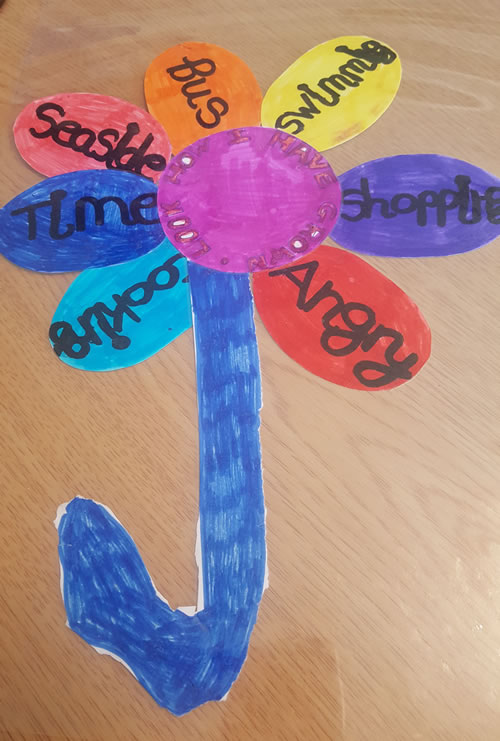Since admission in December 2016, Miss Brown has made plenty of positive achievements which are regularly recognized and praised by staff.
The Assistant Psychologist and Miss Brown met to discuss her views of what she has achieved since living at Connington House and what she is happy with.
Miss Brown did this by making a ‘FLOWER’ called ‘LOOK HOW I HAVE GROWN’ and said the following achievements were important to her:
Bus
Miss Brown recognized that getting the bus was a very big achievement for her. When Miss Brown first moved in she stated she could not get the bus because of her Autism – this triggered a high number of incidents and limited Miss Brown from accessing varied and meaningful activities. Through 1:1 emotional support sessions with the Assistant Psychologist, Miss Brown began to get the bus daily and by her own personal choice. This was helped by the support staff team enforcing the Positive Behavioural Support plan and her structured routine and boundaries.
Swimming, shopping and the seaside
Miss Brown is very proud that she has started to go swimming. The Occupational Therapy team carried out work on varied activities and motivation with Miss Brown to build a person-centred activity timetable. This was to support Miss Brown to engage in activities beyond shopping, as when Miss Brown first moved in, this was her chosen activity each day. This was heavily influenced by Miss Brown’s past experiences in her childhood of impulse shopping and spending hundreds of pounds per day. This meant Miss Brown had no knowledge of budgeting and therefore when she ran out of money and could no longer sustain shopping 7 days a week it would lead to incidents. Budgeting sessions began with Miss Brown and the Occupational Team on how to manage her money to last for a full week. Staff encouraged alternative activities such as trampolining, activity classes, going to the seaside and much more. This reduced the frequency of her shopping and as a result, it has reduced the number of incidents and empowered Miss Brown.
Angry
Miss Brown stated that she was less angry. Through having 1:1 emotional support sessions with the Assistant Psychologist, Miss Brown learned skills to manage her anger and to communicate when feeling upset. This is due to completing hassle logs to debrief after incidents, considering alternative coping strategies and sessions on learning Progression Muscle Relaxation techniques. Miss Brown and the Assistant Psychologist also engaged in ‘3 good things that happened this week’, a strategy to support Miss Brown to have a more positive outlook on her life. Miss Brown has had a significant decrease in her incidents since learning to manage and respond to her anger.
Grown”
Cooking
Due to events in Miss Brown’s childhood, she was reluctant to learn independent skills such as cooking and cleaning. Since developing a Positive Behaviour reward chart with the Assistant Psychologist, Miss Brown has started cooking at least one meal a day and doing her room management daily this is contributing to Miss Brown learning daily living skills that will support her to eventually live with less required support in the future. Miss Brown also enjoys cooking and baking with the Occupational Therapy team to reinforce these skills.
Time
Miss Brown claimed that she was getting better” at being on time for activities. Miss Brown has many ritualistic and repetitive behaviours that often make getting ready in the morning a long and difficult task. The Speech and Language Therapy team supported Miss Brown to manage her time better by implementing a countdown clock that would be set for each individual activity and would buzz when that task was over, e.g. 10 minutes for brushing her hair. Alongside this, Miss Brown also has a daily visual timetable that she can stick Velcro pictures for each activity and a clock showing the time it will begin. These interventions were supported by night staff working consistently to encourage Miss Brown to get up early to begin her activities.
Overall these achievements have contributed to Miss Brown gaining greater independence skills – some of which are personal milestones, greater social and emotional well-being, and feeling happy within herself and her environment.





